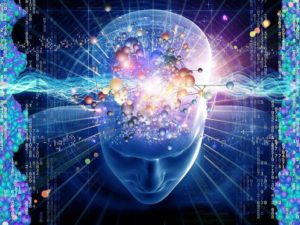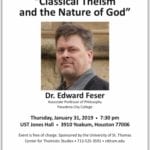Existentialism: Nietzsche and JP Richter–A World Without God

THE MADMAN—-Have you not heard of that madman who lit a lantern in the bright morning hours, ran to the market place, and cried incessantly: “I seek God! I seek God!”—As many of those who did not believe in God were standing around just then, he provoked much laughter. Has he got lost? asked one. Did he lose his way like a child? asked another. Or is he hiding? Is he afraid of us? Has he gone on a voyage? emigrated?—Thus they yelled and laughed
The madman jumped into their midst and pierced them with his eyes. “Whither is God?” he cried; “I will tell you. We have killed him—you and I. All of us are his murderers. But how did we do this? How could we drink up the sea? Who gave us the sponge to wipe away the entire horizon? What were we doing when we unchained this earth from its sun? Whither is it moving now? Whither are we moving? Away from all suns? Are we not plunging continually? Backward, sideward, forward, in all directions? Is there still any up or down? Are we not straying, as through an infinite nothing? Do we not feel the breath of empty space? Has it not become colder? Is not night continually closing in on us? Do we not need to light lanterns in the morning? Do we hear nothing as yet of the noise of the gravediggers who are burying God? Do we smell nothing as yet of the divine decomposition? Gods, too, decompose. God is dead. God remains dead. And we have killed him.
“How shall we comfort ourselves, the murderers of all murderers? What was holiest and mightiest of all that the world has yet owned has bled to death under our knives: who will wipe this blood off us? What water is there for us to clean ourselves? What festivals of atonement, what sacred games shall we have to invent? Is not the greatness of this deed too great for us? Must we ourselves not become gods simply to appear worthy of it? There has never been a greater deed; and whoever is born after us—for the sake of this deed he will belong to a higher history than all history hitherto.”
Here the madman fell silent and looked again at his listeners; and they, too, were silent and stared at him in astonishment. At last he threw his lantern on the ground, and it broke into pieces and went out. “I have come too early,” he said then; “my time is not yet. This tremendous event is still on its way, still wandering; it has not yet reached the ears of men. Lightning and thunder require time; the light of the stars requires time; deeds, though done, still require time to be seen and heard. This deed is still more distant from them than most distant stars—and yet they have done it themselves.
It has been related further that on the same day the madman forced his way into several churches and there struck up his requiem aeternam deo. Led out and called to account, he is said always to have replied nothing but: “What after all are these churches now if they are not the tombs and sepulchers of God?”
Source: Friedrich Nietzsche, The Gay Science (1882, 1887) para. 125; Walter Kaufmann ed. (New York: Vintage, 1974), pp.181-82.]
Jean Paul Richter had a similar insight in considering what it would be like without God:
Christ continued, “I went through the worlds, I ascended to the Sun and flew with the Milky Way through the desert of the Heavens; but there is no God. I descended to the depths of Being’s shadow, and looked into the Abyss and cried, “Father, where are you?” but I heard only the eternal storm that no one governs, and the shimmering rainbow of Existence stood, without the sun that creates it, dripping into the Abyss. And when I looked upon the enormous world under the divine eye, it stared back from an empty, bottomless socket; and eternity lay and gnawed on Chaos and contemplated itself.—Scream on, discords, rend the shadows; for He is not!”…and pressed together crushing the endless temple to a church graveyard-and everything was tight, dark, bang – and an immensely extended bell hammer should strike the last hour of the time and shatter the edifice of the world … when I awoke. My soul wept for joy that he again was able to worship God – and the joy and the tears and the faith in him was the prayer. And when I got up, the sun glowed deep behind the full purple corn stalks and threw peacefully to the reflection of her evening red the little moons that rose without an aurora in the morning.”
Richter, Jean Paul. Siebenkäs. Projekt Gutenberg-DE. SPIEGEL – Nachrichten – Kultur
![]() What does it mean to want to believe in a God? We should ask ourselves, is this desire that the world not be meaninglessness good, bad or neither? It’s bad if there are wrong conclusions drawn from it, just as Nietzsche, in perhaps drawing this causally reductive conclusion. Perhaps we can do the same as Nietzsche and draw a different causally reductive conclusion: It seems rather odd, that for every human desire that exists on this earth, there is an object which will quench that desire. For hunger there is food, for fatigue there is sleep, for sex appeal there is sex, for the desire to achieve there is success, but for the object of hope, of desiring an ultimate purpose…there is a nonexistent God? This is not a syllogistic argument, as many of Nietzsche’s arguments are similar, but it seems rather odd that this could be the case.
What does it mean to want to believe in a God? We should ask ourselves, is this desire that the world not be meaninglessness good, bad or neither? It’s bad if there are wrong conclusions drawn from it, just as Nietzsche, in perhaps drawing this causally reductive conclusion. Perhaps we can do the same as Nietzsche and draw a different causally reductive conclusion: It seems rather odd, that for every human desire that exists on this earth, there is an object which will quench that desire. For hunger there is food, for fatigue there is sleep, for sex appeal there is sex, for the desire to achieve there is success, but for the object of hope, of desiring an ultimate purpose…there is a nonexistent God? This is not a syllogistic argument, as many of Nietzsche’s arguments are similar, but it seems rather odd that this could be the case.
Yes, Nietzsche, “every organism is oriented towards discharging it’s life potential” as you say. Everything aims to be “on top”. I don’t understand how this is not Aristotle in disguise once again–not the word potential. Everything desires to be perfect (some don’t make it) but that perfection is the end of all our actions that end is “the good.” The point where I disagree is on the point that power is the only good.
In my last post, I talked about how the Holy Father sees the importance of proper philosophical and theological training to be able to answer the questions of those inquiring into the faith. Why? Because many already consider our world “Post religious” in the way that this passage describes and inevitably they are going to look at the priest as if they are looking at the madman. The priest should be equipped to give an account of his beliefs via the only interlocutor the two people are going to have–reason.




